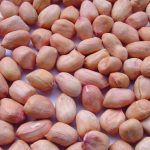Delicious, crunchy, and nutty peanuts are one of the popular oilseeds known to humankind since centuries. The kernels enriched with many noteworthy health-benefiting nutrients essential for optimum health and wellness. They are actually legumes but carry almost all the qualities of other popular edible nuts such as pistachio, almonds, etc. Some of the common names are groundnut, earthnuts, etc.
Peanuts are an excellent source of resveratrol, another polyphenolic antioxidant. Resveratrol has been found to have a protective function against cancers, heart disease, degenerative nerve disease, Alzheimer’s disease, and viral/fungal infections.
Furthermore, studies suggest that resveratrol may reduce stroke risk through altering molecular mechanisms in the blood vessels (reducing susceptibility to vascular damage through decreased activity of angiotensin, a systemic hormone responsible for blood vessel constriction that would elevate blood pressure), and by increasing production of vasodilator hormone, nitric oxide.

Recent research studies suggest that roasting/boiling enhances antioxidant bioavailability in the peanuts. It has been found that boiled peanuts have two and four-fold increase in isoflavone antioxidants biochanin-A and genistein content, respectively. (Journal of agricultural and food chemistry).
The kernels are an excellent source of vitamin-E(α -tocopherol); containing about 8 g per100 g. vitamin-E is a powerful lipid soluble antioxidant which helps maintain the integrity of mucosa and skin by protecting from harmful oxygen free radicals.
The nuts are packed with many important B-complex groups of vitamins such as riboflavin, niacin, thiamin, pantothenic acid, vitamin B-6, and folates. 100 g of peanuts provide about 85% of RDI of niacin, which contributes to health and blood flow to the brain.
The nuts are a rich source of minerals like copper, manganese, potassium, calcium, iron, magnesium, zinc, and selenium.


